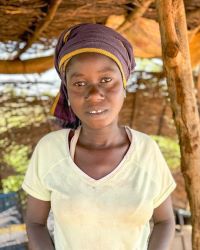During the 1700s, there were two Bambara kingdoms: Segu and Karta. In the 1800s, militant Muslim groups overthrew these kingdoms, leaving only a few anti-Muslim Bambara warlords to resist their occupation. This lasted 40 years, until the arrival of the French colonialists. A very small number of the Bambara had converted to Islam by 1912.
After World War II, the number of Muslim converts grew due to their exposure to Muslim merchants and their resistance to the French. Today, the Bambara are mostly Muslim. We usually think of them as living in Mali, but many also live in Cote d 'Ivoire and other countries in West Africa.
The Bambara people live in many places of West Africa including Cote d 'Ivoire. They are usually associated with Mali where they make up a large part of the population.
The Bambara people are intermingled with other African tribes, and they have no centralized organization. Instead, each small district, made up of villages, answers to a dominant family that designates a chief. This chief, aka, fama, has much power, but he must defer to a council of elders.
Bambaras have a patrilineal and patriarchal social structure, meaning that men hold most of the decision-making power. Traditionally they had a hierarchal system with castes, nobles, etc. but that has changed. Extended families live in the same village, and they work together to make sure everyone's needs are met. Bambara people marry outside their extended families. A man can have multiple wives. He always wants a wife who can work hard and bear many children.
Although most Bambara claim to be Muslim, many still follow their traditional beliefs. Though they believe in a god of creation, he is not necessarily associated with Allah, the god of Islam. Bambara traditional beliefs include ancestor worship, or praying to deceased ancestors for guidance. The Bambara believe that the ancestral spirits may take on the forms of animals or even vegetables. In special ceremonies, the spirits are worshipped and presented with offerings of flour and water. The eldest member of a lineage acts as the "mediator" between the living and the dead.
Several mission agencies are currently focusing on the Bambara, and they have made some progress, but there needs to be more workers, especially in Cote d 'Ivoire. Prayer is the key to tearing down the remaining strongholds that are keeping them from knowing the truth.
Ask God to grant wisdom and favor to the mission agencies that are currently focusing on the Bambara.
Pray for the effectiveness of the JESUS Film among the Bambara people in Cote d 'Ivoire.
Pray that the Holy Spirit will complete the work begun in the hearts of the Bambara believers through adequate discipleship.
Pray that God will give the Bambara believers boldness to share the love of Jesus with their own people.
Ask the Lord to raise strong, reproducing local churches among the Bambara.
Scripture Prayers for the Bambara in Côte d'Ivoire.
Profiles written by Global Prayer Digest
https://joshuaproject.net/people_groups/10617/IV
https://www.britannica.com/topic/Bambara
https://en.wikipedia.org/wiki/Bambara_people
https://www.ethnologue.com/language/bam
http://kwekudee-tripdownmemorylane.blogspot.com/2013/08/bambara-bamana-people-malian-ancient.html
http://www.zyama.com/bambara/
https://www.africaguide.com/culture/tribes/bambara.htm
| Profile Source: Keith Carey |











